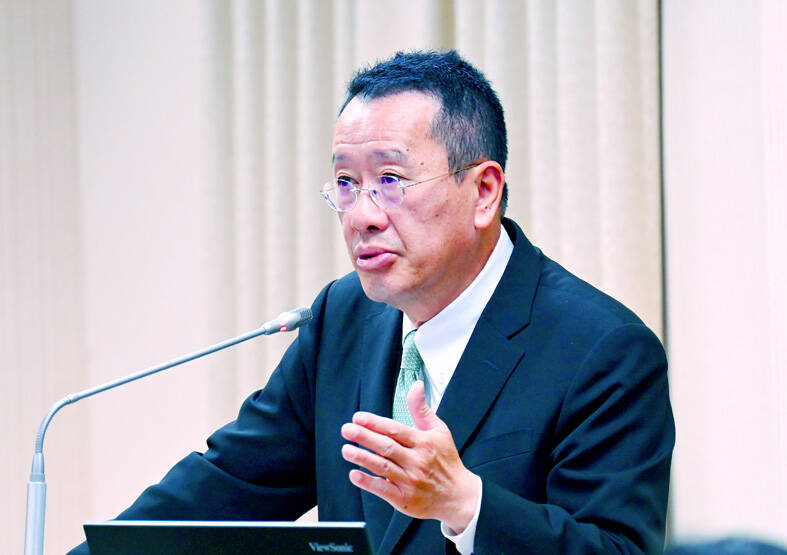Sixty-two military personnel held Chinese residence permits, including two volunteer service members, Minister of National Defense Wellington Koo (顧立雄) said at the legislature in Taipei yesterday, citing a probe that ended last month.
None of the personnel had Chinese passports, ID cards or permanent residency status, Koo told a meeting of the Foreign Affairs and National Defense Committee.
The personnel have been barred from combat operation centers, as well as units that handle sensitive information such as intelligence collection, information and communications, and research and development, he said.

Photo: Liu Hsin-de, Taipei Times
They also cannot be aides to commanding officers, he added.
Those with Chinese residency are also prevented from serving in aviation or naval units, and cannot operate new weapons systems, Koo said.
Media in February reported that a sailor surnamed Yang (楊) had obtained a Chinese ID card without his knowledge after his mother, a Chinese national who gained Taiwanese residency after marriage, applied on his behalf.
Yang said he wanted to renounce his Chinese citizenship.
The Ministry of National Defense in the past few days said that it had helped Yang declare his intent to the National Immigration Agency to retain his Taiwanese nationality.
Yang has been reassigned to a position that does not involve sensitive or classified information, the defense ministry said.
The screening process would be tightened to require volunteer service members to declare upon application that they hold no dual nationality or residency, it said.
The committee yesterday reviewed draft amendments to the Act of Military Service for Officers and Non-commissioned Officers of the Armed Forces (陸海空軍軍官士官服役條例) that would strip the military pensions of service members convicted of and imprisoned for rebellion, treason or contraventions of the National Security Act (國安法) during active service or after retirement.
Koo said that on Jan. 1, he approved 54 additional positions for the counterintelligence unit and personnel are being recruited to fill them.
Koo was also asked about shipbuilding.
Asked whether Taiwan would boost cooperation with the US in shipbuilding and ship-repair operations, Koo said that Taiwan “intends to do so,” without elaborating.

INVESTIGATION: The case is the latest instance of a DPP figure being implicated in an espionage network accused of allegedly leaking information to Chinese intelligence Democratic Progressive Party (DPP) member Ho Jen-chieh (何仁傑) was detained and held incommunicado yesterday on suspicion of spying for China during his tenure as assistant to then-minister of foreign affairs Joseph Wu (吳釗燮). The Taipei District Prosecutors’ Office said Ho was implicated during its investigation into alleged spying activities by former Presidential Office consultant Wu Shang-yu (吳尚雨). Prosecutors said there is reason to believe Ho breached the National Security Act (國家安全法) by leaking classified Ministry of Foreign Affairs information to Chinese intelligence. Following interrogation, prosecutors petitioned the Taipei District Court to detain Ho, citing concerns over potential collusion or tampering of evidence. The

‘FORM OF PROTEST’: The German Institute Taipei said it was ‘shocked’ to see Nazi symbolism used in connection with political aims as it condemned the incident Sung Chien-liang (宋建樑), who led efforts to recall Democratic Progressive Party (DPP) Legislator Lee Kun-cheng (李坤城), was released on bail of NT$80,000 yesterday amid an outcry over a Nazi armband he wore to questioning the night before. Sung arrived at the New Taipei City District Prosecutors’ Office for questioning in a recall petition forgery case on Tuesday night wearing a red armband bearing a swastika, carrying a copy of Adolf Hitler’s Mein Kampf and giving a Nazi salute. Sung left the building at 1:15am without the armband and apparently covering the book with a coat. This is a serious international scandal and Chinese

Seventy percent of middle and elementary schools now conduct English classes entirely in English, the Ministry of Education said, as it encourages schools nationwide to adopt this practice Minister of Education (MOE) Cheng Ying-yao (鄭英耀) is scheduled to present a report on the government’s bilingual education policy to the Legislative Yuan’s Education and Culture Committee today. The report would outline strategies aimed at expanding access to education, reducing regional disparities and improving talent cultivation. Implementation of bilingual education policies has varied across local governments, occasionally drawing public criticism. For example, some schools have required teachers of non-English subjects to pass English proficiency

TRADE: The premier pledged safeguards on ‘Made in Taiwan’ labeling, anti-dumping measures and stricter export controls to strengthen its position in trade talks Products labeled “made in Taiwan” must be genuinely made in Taiwan, Premier Cho Jung-tai (卓榮泰) said yesterday, vowing to enforce strict safeguards against “origin laundering” and initiate anti-dumping investigations to prevent China dumping its products in Taiwan. Cho made the remarks in a discussion session with representatives from industries in Kaohsiung. In response to the US government’s recent announcement of “reciprocal” tariffs on its trading partners, President William Lai (賴清德) and Cho last week began a series of consultations with industry leaders nationwide to gather feedback and address concerns. Taiwanese and US officials held a videoconference on Friday evening to discuss the